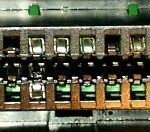OBD2 Bluetooth scanners have revolutionized automotive diagnostics, offering DIY enthusiasts and professional mechanics alike the power to read vehicle data wirelessly via their smartphones or tablets. Among the myriad of systems these tools can access, the Anti-lock Braking System (ABS) is paramount for safety. When it comes to diagnosing and troubleshooting ABS issues using OBD2 Bluetooth scanners, the integrity and accuracy of the underlying data become critically important.
The effectiveness of any Obd2 Bluetooth Abs scanner hinges on its ability to correctly interpret and present vehicle data. This data, especially for complex systems like ABS, originates from the vehicle manufacturers (OEMs). Accessing and utilizing this OEM data ethically and legally is a cornerstone of reliable diagnostic tools. However, the path to obtaining this crucial information isn’t always straightforward, and shortcuts taken by some scanner companies can compromise the accuracy and safety of ABS diagnostics.
Legitimate automotive diagnostic tool manufacturers, like reputable brands in the industry, prioritize obtaining OEM data through proper licensing channels. This process ensures that the scanner is equipped with the most up-to-date and accurate information directly from the vehicle manufacturers. This commitment to ethical data sourcing is particularly vital for ABS systems, where precise readings and correct interpretations are essential for accurate diagnosis and repair. ABS is a critical safety system, and misdiagnosis due to flawed data can have serious consequences.
Conversely, some less scrupulous scanner companies may resort to unethical practices to quickly bring products to market or offer seemingly comprehensive vehicle coverage. These practices often involve reverse-engineering or hacking OEM software to extract data without proper authorization. While this approach might appear to offer a cost-effective solution, it comes with significant risks. Scanners relying on illegally obtained data are not only susceptible to becoming inoperable (“bricked”) due to manufacturer countermeasures, but they also inherently compromise the accuracy and reliability of diagnostic information, especially concerning intricate systems like ABS.
Imagine relying on an OBD2 Bluetooth scanner with compromised data to diagnose an ABS fault. Inaccurate readings or misinterpreted codes could lead to incorrect repairs, leaving the actual issue unresolved and potentially jeopardizing vehicle safety. For ABS, this could mean a delayed or ineffective response in emergency braking situations, directly impacting driver and passenger safety.
Therefore, when selecting an OBD2 Bluetooth ABS scanner, it is crucial to prioritize brands known for their commitment to ethical data sourcing and legitimate OEM licensing. While the initial investment might be slightly higher, the assurance of accurate, reliable, and safe ABS diagnostics is invaluable. Choosing a reputable brand minimizes the risk of encountering inaccurate data, scanner malfunctions, and potential legal issues associated with unethical data practices. Ultimately, for critical systems like ABS, data integrity is not just a technical detail; it’s a matter of safety and responsible vehicle maintenance.
